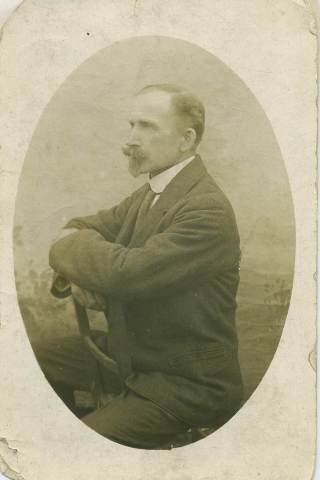
In 1888, 23 year old German born Karl Fahlbusch, full of hope and ambition, travelled to England to find a new life.
Having fallen in love with a Bavarian opera singer, Franziska Crist, it is believed they married in Whitechapel, London that same year. They ultimately settled in the Wirral to bring up their five children.
By 1914 the family had changed their name to Myerson and he and his wife became Charles and Francis. Their five children had known no other than an English born life. So when war was declared it was inevitable that their son, Albert would want to fight for his country of birth, like so many of his friends, against the enemy which happened to be the country his parents had left a lifetime ago.
Despite this commitment to the England they called home and where Karl worked as an interpreter, speaking 7 languages, the events leading up to and after the outbreak of war meant that Karl suddenly became an “enemy alien”. Germanophobia had taken hold and, despite being 49 years of age, Karl was destined to spend the First World War at Knockaloe Farm, Patrick on the Isle of Man.
As Karl was initially held to await his fate for the duration, he doubtless heard tell of the stories of Knockaloe Camp, the wind swept muddy wasteland surrounded by barbed wire on an Island in the middle of the Irish Sea.
Due to his poor eyesight, his son, Albert, was disqualified from fighting for his country, but he did manage to visit his father in Knockaloe on a number of occasions. Upon arrival in Douglas, he would travel by train to Peel and then walk out to Patrick.
Just like the vast proportion of the internees, the end of the war did not bring a happy ending. Rather than being sent back to his family, Karl was sent back to Germany and died there, alone, shortly thereafter whilst his wife and children remained in England. It was the Red Cross who informed his wife of his death. She wore black for the remainder of her life.
Just like many other ex-internees and their families, Karl and his family did not speak much of his internment. The aftermath of the war brought an unsettled peace and having German blood was something to hide. Just like thousands of others, this became a lost period of the family history.
It is Karl’s great granddaughter who has been instrumental in piecing together her family history from fragmentary family information. Ironically, she lives with her husband and children less than two miles from where her Great Grandfather was interned and we are delighted that she has volunteered to help us to help other descendants learn something of their family’s past.